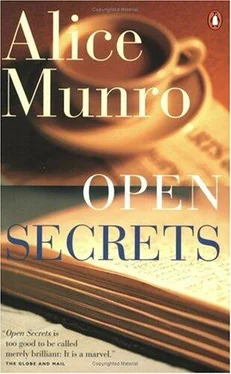Sometimes she would pester him a little and he would say, “Now, Maureen. What’s all this about?” Or else he would tell her to grow up. “Grow up” was an injunction that he had picked up from his own children, and had continued to use long after they had dropped it, in fact long after they had moved away from home.
His saying that humiliated her, and her eyes would fill with tears. He was a man who detested tears above all things.
And now, she thought, wouldn’t it be a relief to have that state of affairs back again! For her husband’s appetite had returned — or an entirely new appetite had developed. There was nothing now of the rather clumsy ceremony, the formal fondness, of their early times together. Now his eyes would cloud over and his face would seem weighed down. He would speak to her in a curt and menacing way and sometimes push and prod her, even trying to jam his fingers into her from behind. She did not need any of that to make her hurry — she was anxious to get him into the bedroom as soon as possible, afraid that he might misbehave elsewhere. His old office had been made into a downstairs bedroom with a bathroom adjoining it, so that he would not have to climb the stairs. At least that room had a lock, so Frances could not burst in. But the phone might ring, Frances might have to come looking for them. She might stand outside the door and then she would have to hear the noises — Lawyer Stephens’ panting and grunting and bullying, the hiss of disgust with which he would order Maureen to do this or that, his pounding of her right at the end and the command he let out then, a command that perhaps would be incoherent to anybody but Maureen but that would still speak eloquently, like lavatory noises, of his extremity.
“Ta’ dirty! Ta’ dirty!”
This came from a man who had once shut Helena in her room for calling her brother a shitty bastard.
Maureen knew enough words, but it was difficult for her in her shaken state to call up just which ones might suit, and to utter them in a tone that would be convincing. She did try. She wanted above all else to help him along.
Afterward he fell into the brief sleep that seemed to erase the episode from his memory. Maureen escaped to the bathroom. She did the first cleanup there and then hurried upstairs to replace some clothing. Often at these times she had to hang onto the bannisters, she felt so hollow and feeble. And she had to keep her mouth closed not on any howls of protest but on a long sickening whimper of complaint that would have made her sound like a beaten dog.
Today she managed better than usual. She was able to look into the bathroom mirror, and move her eyebrows, her lips and jaws, around to bring her expression back to normal. So much for that, she seemed to be saying. Even while it was going on she had been able to think of other things. She had thought about making a custard, she thought about whether they had enough milk and eggs. And right through her husband’s rampage she thought of the fingers moving in the feathers, the wife’s hand laid on top of the husband’s, pressing down.
So of Heather Bell we will sing our song ,
As we will till our day is done .
In the forest green she was taken from the scene
Though her life had barely begun .
“There is a poem already made up and written down,” Frances said. “I’ve got it here typed out.”
“I thought I’d make a custard,” said Maureen.
How much had Frances heard of what Marian Hubbert had said? Everything, probably. She sounded breathless with the effort of keeping all that in. She held up the typed lines in front of Maureen’s face and Maureen said, “It’s too long, I don’t have time.” She started to separate the eggs.
“It’s good,” Frances said. “It’s good enough to be put to music.”
She read it through aloud. Maureen said, “I have to concentrate.”
“So I guess I got my marching orders,” said Frances, and went to do the sunroom.
Then Maureen had the peace of the kitchen — the old white tiles and high yellowed walls, the bowls and pots and implements familiar and comforting to her, as probably to her predecessor.
What Mary Johnstone told the girls in her talk was always more or less the same thing and most of them knew what to expect. They could even make prepared faces at each other. She told them how Jesus had come and talked to her when she was in the iron lung. She did not mean in a dream, she said, or in a vision, or when she was delirious. She meant that He came and she recognized Him but didn’t think anything was strange about it. She recognized Him at once, though he was dressed like a doctor in a white coat. She thought, Well, that’s reasonable — otherwise they wouldn’t let Him in here. That was how she took it. Lying there in the iron lung, she was sensible and stupid at once, as you are when something like that hits you. (She meant Jesus, not the polio.) Jesus said, “You’ve got to get back up to bat, Mary.” That was all. She was a good Softball player, and He used language that He knew she would understand. Then He went away. And she hugged onto Life, the way He had told her to.
There was more to follow, about the uniqueness and specialness of each of their lives and their bodies, which led of course into what Mary Johnstone called “plain talk” about boys and urges. (This was where they did the faces — they were too abashed when she was going on about Jesus.) And about liquor and cigarettes and how one thing can lead to another. They thought she was crazy — and she couldn’t even tell that they had smoked themselves half sick last night. They reeked and she never mentioned it.
So she was — crazy. But everybody let her talk about Jesus in the hospital because they thought she was entitled to believe that.
But suppose you did see something? Not along the line of Jesus, but something? Maureen has had that happen. Sometimes when she is just going to sleep but not quite asleep, not dreaming yet, she has caught something. Or even in the daytime during what she thinks of as her normal life. She might catch herself sitting on stone steps eating cherries and watching a man coming up the steps carrying a parcel. She has never seen those steps or that man, but for an instant they seem to be part of another life that she is leading, a life just as long and complicated and strange and dull as this one. And she isn’t surprised. It’s just a fluke, a speedily corrected error, that she knows about both lives at the same time. It seemed so ordinary, she thinks afterward. The cherries. The parcel.
What she sees now isn’t in any life of her own. She sees one of those thick-fingered hands that pressed into her tablecloth and that had worked among the feathers, and it is pressed down, unresistingly, but by somebody else’s will — it is pressed down on the open burner of the stove where she is stirring the custard in the double boiler, and held there just for a second or two, just long enough to scorch the flesh on the red coil, to scorch but not to maim. In silence this is done, and by agreement — a brief and barbaric and necessary act. So it seems. The punished hand dark as a glove or a hand’s shadow, the fingers spread. Still in the same clothes. The cream-colored sleeve, the dull blue.
Maureen hears her husband moving around in the front hall, so she turns off the heat and lays down the spoon and goes in to him. He has tidied himself up. He is ready to go out. She knows without asking where he is going. Down to the Police Office, to find out what has been reported, what is being done.
“Maybe I should drive you,” she says. “It’s hot out.”
He shakes his head, he mutters.
“Or I could walk along with you.”
No. He is going on a serious errand and it would diminish him to be accompanied or transported by a wife.
Читать дальше












